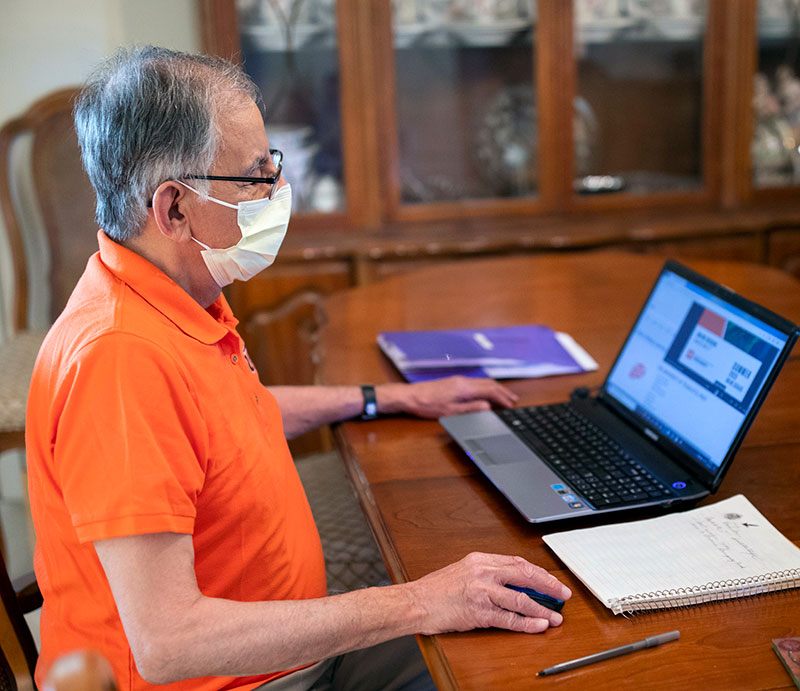
UTEP and Community Partners Awarded $1.5M NSF Grant to Improve Quality of Life for Senior Citizens through Technology
Last Updated on October 19, 2020 at 9:00 AM
Originally published October 19, 2020
By Christina Rodriguez
UTEP Communications
A team of interdisciplinary researchers from The University of Texas at El Paso in collaboration with the City of El Paso and El Paso Community College (EPCC) recently was awarded nearly $1.5 million from the National Science Foundation (NSF) to develop and sustain the social connectedness of seniors to improve their quality of life through technology, community engagement and social sciences.

The Smart Social Connector (SSC) project, led by principal investigator Natalia Villanueva Rosales, Ph.D., associate professor of computer science at UTEP, addresses social isolation due to age-related barriers by creating informed strategies for seniors to learn and adopt technology.
“This interdisciplinary project combines community-based participatory research, social sciences, and engineering and science dimensions to examine the role of mobile technologies and social connectivity in face-to-face and virtual interactions,” said Roberto Osegueda, Ph.D., vice president for research at UTEP. “This is a great example of interdisciplinary research that focuses on a relevant societal problem. I am very proud of the team.”
The project promotes meaningful social connectedness among seniors that creates a sense of belonging within their community to aid in advancing their health and welfare. From the perspective of social and behavioral sciences, the project will increase understanding of systemic and behavioral factors that both facilitate and hinder the learning and adoption of technology. From the technological perspective, the project will leverage and enhance smart city infrastructure to foster social and technological connectedness for seniors.
“We are grateful to the National Science Foundation for funding this exciting project that will allow us to expand our knowledge about the use of technology by older adults and bridge the generational digital divide through Smart Cities solutions,” Villanueva Rosales said. “This is a very important and timely issue that we must address as a society. This project also contributes to the training of the next generation of engineers and scientists with interdisciplinary training addressing problems with impact on their community.”
The interdisciplinary research team assigned to the SSC project each has expertise in engineering and social sciences, experience working on smart cities solutions in the United States and Mexico, as well as a record for efficiently collaborating across institutions.
The research team at UTEP includes Ashley Bangert, Ph.D., assistant professor of psychology; Oscar Mondragon, Ph.D., clinical associate professor of computer science; Gina Núñez-Mchiri, Ph.D., associate professor of anthropology and director of Women and Gender Studies; and Kelvin Cheu, Ph.D., professor of civil engineering.
Community collaborators include City of El Paso partners under the leadership and direction of City Manager Tommy Gonzalez and Mary Yanez, director of the Senior Adult Program at EPCC.
“Our EPCC Senior Adult Program mission is to promote community partnerships and provide educational and social opportunities for our multi-cultural senior population,” Yanez said. “This partnership with UTEP researchers is of utmost importance because it benefits the older adult community who we serve. We will discover their needs as a technologically disconnected population and how we will help them to connect to services, transportation, education, and social aspects to maintain a healthy lifestyle.”
Núñez-Mchiri says this research is imperative to help improve the quality of life for older adults, who with time, often become isolated and disconnected from their friends and family members when they experience mobility challenges. She says that by examining how seniors use technology to connect with others and with services in El Paso, researchers will address the need for technology education and intergenerational collaboration to tackle social isolation, ultimately leading to a better quality of life for seniors.
The NSF grant will enable the creation of human and technological infrastructure, as well as facilitate the use of services for seniors provided by the city and community partners with the use of technology. According to researchers, this interdisciplinary, collaborative endeavor will be transformative due to its potential to shift attitudes and behaviors toward seniors by restoring their visibility, value and equitable participation in their community, and can be applied to other cities in the future.
“The City of El Paso, through its collaborative Communities of Excellence Program, is excited to be a recipient alongside UTEP and EPCC for this National Science Foundation grant,” Gonzalez said. “This grant will provide us with the opportunity to continue executing our strategic plan, specifically to enhance El Paso’s quality of life through recreational, cultural and educational environments with a focus on the quality of life and technological engagement of our senior community.”
